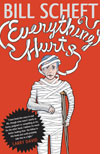|
PRAISE FOR EVERYTHING HURTS
The many mordant one-liners in EVERYTHING HURTS underscore that Mr. Scheft is a skillful writer who can find laughs in unlikely situations.
—JANET MASLIN, NEW YORK TIMES
Pain is king, and laughter is his fool....The book achieves a subtle poignancy, which grow(s) more wrenching.
—CHICAGO SUN-TIMES
Satisfying as it is quirky....Scheft knows how to create strong characters which stay in your head long after you finish the book.
—ARMCHAIR INTERVIEWS
"I have lived this story in real life, though mine wasn't nearly as funny, poignant or compelling as this. On the other hand, I believe I'm much better looking than the fellow in this book and could probably take him in a fight."
—LARRY DAVID
“How rare it is for a novel to be both hilarious and profoundly moving. In Everything Hurts Bill Scheft is firing on all eight rumbling, throaty cylinders.”
—RICHARD RUSSO, Pulitzer Prize-winning author
"I love this fresh, brilliant and hilarious novel. Bill Scheft has written an original story full of twists and turns that will surprise and delight you. Bookclubs: choose Everything Hurts- it is the ultimate guide to a man's heart, intellect and spinal column—and once and for all will answer the question 'Why won't my man go to the doctor?'"
—ADRIANA TRIGIANI, Bestselling Author of the Big Stone Gap series and "Very Valentine"
“Bill Scheft masterfully gives us a tale full of wisdom and grace. Everything Hurts is a story of self-realization, family, the nature of our politics and our pain. He does it all with a razor sharp sense of humor, that cuts to the bone."
—LEWIS BLACK, Comedian/Author, "Me of Little Faith"
“If you’ve never felt physical pain or experienced family problems, then this book is not for you. Otherwise, join the fun, family, stand-up comedy, deep felt angst, frustration, lust, loss, and love of Phil Camp, aka Marty Fleck. In Everything Hurts, everything hurts because it’s so funny and also: everything moves beyond the funny-bone, past Rush Limbaugh and Jerry Springer and Keats—straight to the secret closet of your heart. Bill Scheft smokes."
—CLYDE EDGERTON, Author of "The Bible Salesman" and "Walking Across Egypt"

 THE BOSTON GLOBE:Phil Camp has pain. He has pain the way other people have phobias or fixations, and it elicits a supreme indignation that he, an otherwise healthy man of middle years, should have to go through life feeling like a geezer. THE BOSTON GLOBE:Phil Camp has pain. He has pain the way other people have phobias or fixations, and it elicits a supreme indignation that he, an otherwise healthy man of middle years, should have to go through life feeling like a geezer.
Several years back, to finance his divorce, Phil, a sometime sportswriter, turned out a mock self-help book called "Where Can I Stow My Baggage?" and has been living off it ever since as a humor columnist. Believing that his pain must be psychosomatic, the cranky egotist turns for help to an assortment of enablers: a genial psychiatrist who isn't achieving much in the way of breakthroughs but is a good audience for Phil's quips; a mind-over-matter medical guru; and a right-wing radio blowhard who happens to be Phil's brother. Their numbers are soon augmented by a stunning psychoanalyst, the guru's daughter.
Bill Scheft, a writer for David Letterman, which tells us all we need to know about his aesthetic, plays both ends against the middle, satirizing our glib and cynical pop culture in a glib and cynical novel. Phil grows on us despite himself, though, and even wrings a weary cheer as he at last emerges from a world-record adolescence.
 BOOKLIST:Phil Camp never wanted to be a self-help guru. The bestseller he wrote under a pseudonym was meant to be a parody. Instead it is taken seriously and soon earns him a spot writing a thoughtful self-improvement newspaper column. But how can he help others when he can barely help himself? For the past ten months Phil has been in constant pain, walking with a limp and lying on a wrestling mat on his apartment floor. He’s introduced to a book by Dr. Samuel Abrun, who says that the pain is all psychosomatic. Between Phil’s traumatic childhood stories and irritation at having a right-wing radio blowhard for a half-brother, this new neurotic development is just one more layer for his therapist to dissect. Ultimately Phil’s quest for pain relief leads him on a trip that does more than any self-help book possibly could. Scheft, a writer for The Late Show with David Letterman, has created a wincingly funny, honest, and sardonic novel. BOOKLIST:Phil Camp never wanted to be a self-help guru. The bestseller he wrote under a pseudonym was meant to be a parody. Instead it is taken seriously and soon earns him a spot writing a thoughtful self-improvement newspaper column. But how can he help others when he can barely help himself? For the past ten months Phil has been in constant pain, walking with a limp and lying on a wrestling mat on his apartment floor. He’s introduced to a book by Dr. Samuel Abrun, who says that the pain is all psychosomatic. Between Phil’s traumatic childhood stories and irritation at having a right-wing radio blowhard for a half-brother, this new neurotic development is just one more layer for his therapist to dissect. Ultimately Phil’s quest for pain relief leads him on a trip that does more than any self-help book possibly could. Scheft, a writer for The Late Show with David Letterman, has created a wincingly funny, honest, and sardonic novel.
 KIRKUS:Retired sportswriter Phil Camp feels bad about his back. And his love life. And his family. And his childhood torments. KIRKUS:Retired sportswriter Phil Camp feels bad about his back. And his love life. And his family. And his childhood torments.
Surprisingly, Scheft (Time Won’t Let Me, 2005, etc.), a veteran writer for The Late Show With David Letterman, keeps Phil’s story appealingly light. On a lark, Phil spent a few weeks writing a parody of self-help books; Where Do I Stow My Baggage? became a runaway bestseller thanks to the many readers who didn’t think it was a joke. The book and the syndicated column it inspired, written under the nom de plume Marty Fleck, have left Camp financially comfortable but in pain everywhere else. His back aches, his ex-wife sabotaged his last serious relationship and his half-brother Jim McManus is a Limbaugh-like radio host who routinely takes on-air swipes at the insipidness of Fleck’s insights. Shortly before Phil has back surgery, a stranger tips him off to The Power of “Ow!” by Dr. Samuel Abrun, who argues that physical pain is actually a mental problem. From there ensues a comedy of errors involving Abrun’s bright, emotionally wounded daughter; warring misunderstandings between Phil and Jim; and a host of memories about childhood neglect and adult infidelity. To keep that last plot thread from becoming too mordant, Scheft applies a Woody Allen-ish tone. Phil is genial, self-deprecating and quick with an ironic wisecrack, but ready to lay himself emotionally bare as well. Like Allen, Scheft seems to know his way around the psychiatrist’s couch; he has a keen sense of the emotional pathways of depression and of how therapy awkwardly leads people into and out of their worst experiences. A few beams are creaky: A subplot involving Derek Jeter doesn’t quite work, and the relationship between Abrun and his daughter lacks the main story’s depth. But Scheft’s rendering of family dysfunction is consistently sturdy. Much like Phil’s fictitious self-help book: meant as a gag, but with enough smarts to be taken seriously.
 PUBLISHER'S WEEKLY:Letterman writer Scheft skewers physical and emotional pain with a mercilessly comic touch and a bit of poignancy. Phil Camp is an accidental guru who wrote a farcical self-help book under the name Marty Fleck as a joke—he swears—to pay off his divorce settlement. But years have passed, and people still read Fleck’s advice as if it’s the real thing. Phil, meanwhile, is limping into middle age with an excruciating, undiagnosable leg pain that his own self-help guru tells him is all in his head. Even while trying to lose the limp, woo his guru’s daughter, pour out his troubles in absurd therapy sessions and confront the antagonism he has with his right-wing radio talk-show host half-brother, Phil maintains his ability to quip and deliver one-liners. But more important, his journey to avoid bodily discomfort leads him to some less corporeal truths about his life—and a reassessment of Marty Fleck. Despite the book’s sometimes overly involved asides and flashbacks, Phil is a wonderful protagonist, and Scheft’s biting wit coexists nicely with the undercurrent of uplift. (Apr.) PUBLISHER'S WEEKLY:Letterman writer Scheft skewers physical and emotional pain with a mercilessly comic touch and a bit of poignancy. Phil Camp is an accidental guru who wrote a farcical self-help book under the name Marty Fleck as a joke—he swears—to pay off his divorce settlement. But years have passed, and people still read Fleck’s advice as if it’s the real thing. Phil, meanwhile, is limping into middle age with an excruciating, undiagnosable leg pain that his own self-help guru tells him is all in his head. Even while trying to lose the limp, woo his guru’s daughter, pour out his troubles in absurd therapy sessions and confront the antagonism he has with his right-wing radio talk-show host half-brother, Phil maintains his ability to quip and deliver one-liners. But more important, his journey to avoid bodily discomfort leads him to some less corporeal truths about his life—and a reassessment of Marty Fleck. Despite the book’s sometimes overly involved asides and flashbacks, Phil is a wonderful protagonist, and Scheft’s biting wit coexists nicely with the undercurrent of uplift. (Apr.)
|

|

